The track cycling world championships generally elicit great racing. In an Olympic year, it’s even more intense. In an Olympic year in which it remains uncertain if the Olympics will go ahead, it may be the finest showcase of racing on the velodrome for a while…
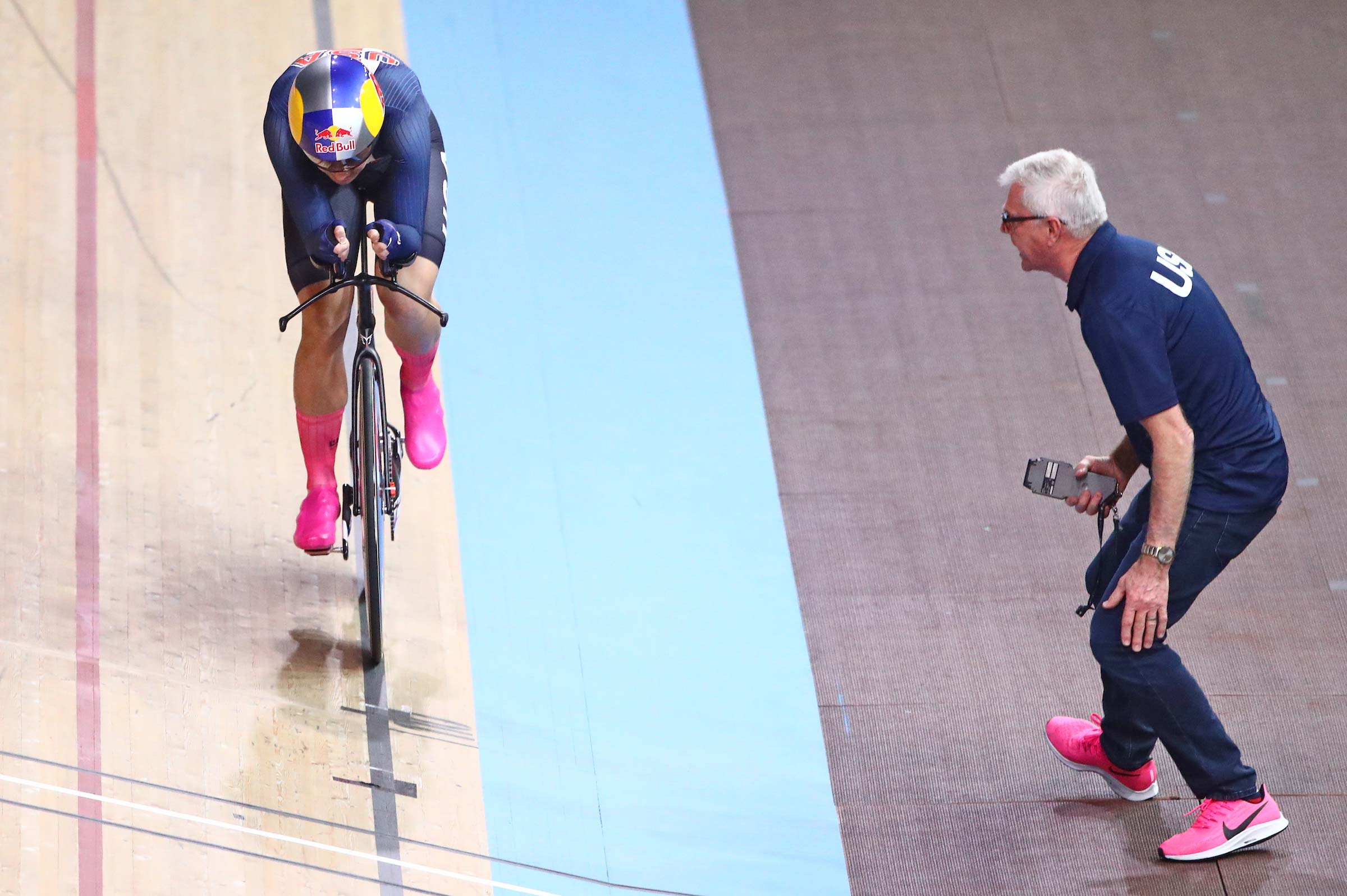
Gary Sutton urges Chloe Dygert on during her world record ride in the final of the individual pursuit. (Photo: @UCI_Track)
Let’s begin an overview of the five days of the #TrackWorlds2020 in Berlin, Germany, with a look at the final medal table.
| Nation | Gold | Silver | Bronze | Total |
| Netherlands | 6 | 2 | 1 | 9 |
| Germany | 4 | 1 | 3 | 8 |
| United States | 2 | 3 | 0 | 5 |
| Denmark | 2 | 0 | 0 | 2 |
| Italy | 1 | 2 | 3 | 6 |
| France | 1 | 2 | 2 | 5 |
| Great Britain | 1 | 2 | 1 | 4 |
| New Zealand | 1 | 2 | 0 | 3 |
| Japan | 1 | 1 | 0 | 2 |
| Belarus | 1 | 0 | 0 | 1 |
| Australia | 0 | 1 | 2 | 3 |
| Spain | 0 | 1 | 1 | 2 |
| Mexico | 0 | 1 | 0 | 1 |
| Russia | 0 | 1 | 0 | 1 |
| South Korea | 0 | 1 | 0 | 1 |
| Malaysia | 0 | 0 | 2 | 2 |
| China | 0 | 0 | 1 | 1 |
| Hong Kong | 0 | 0 | 1 | 1 |
| Norway | 0 | 0 | 1 | 1 |
| Poland | 0 | 0 | 1 | 1 |
| Portugal | 0 | 0 | 1 | 1 |
| Totals (21 nations) | 20 | 20 | 20 | 60 |
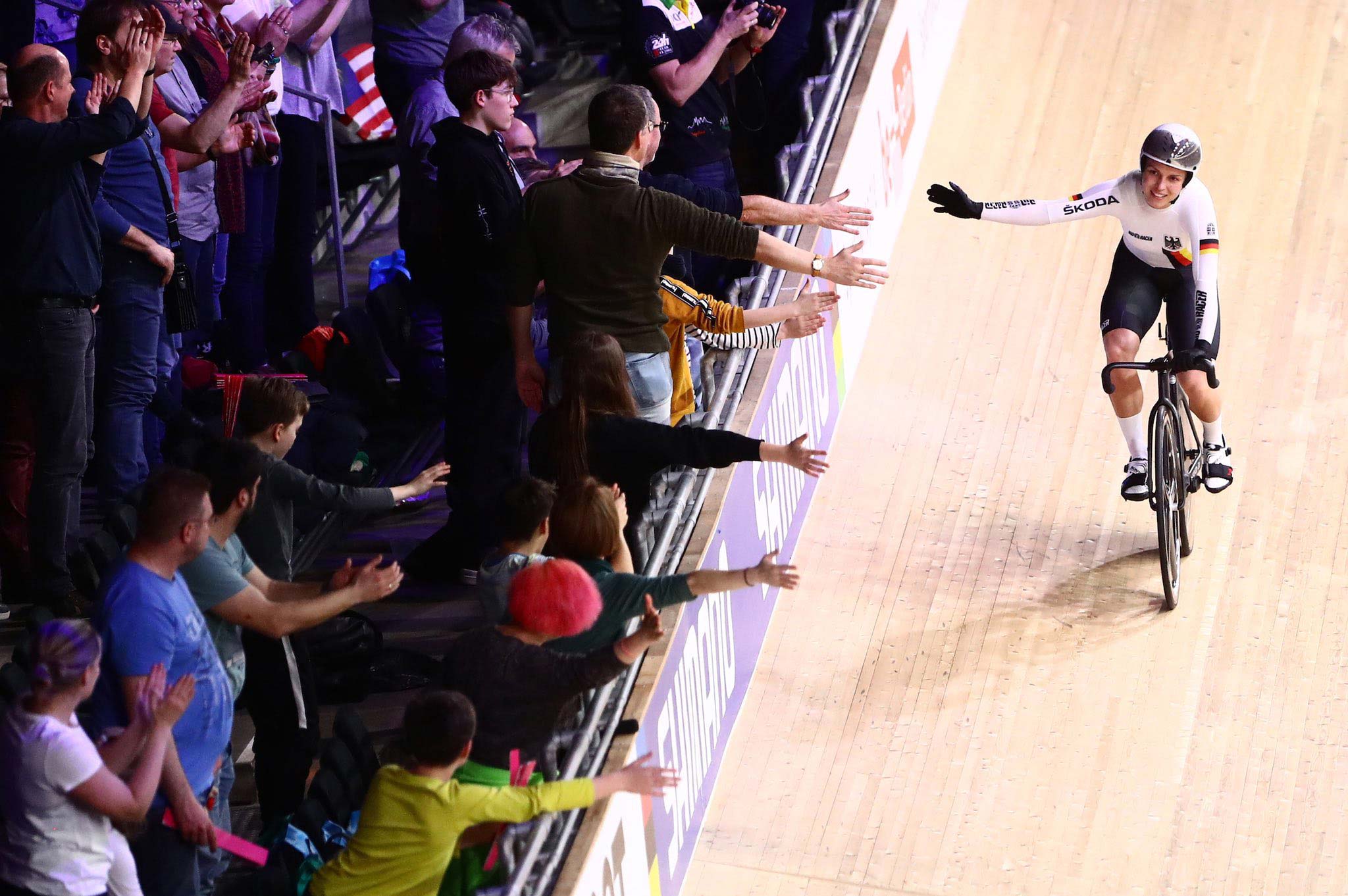
When compared with the Olympic program, the worlds provide far more options; 20 events were decided in Berlin, versus 12 that are due to be raced in Japan later in the year.
If racing goes ahead in Tokyo in July and August – something that remains uncertain as each day brings more reports of the impact of COVID-19 – there will be 12 gold medals decided on the track: keirin, Madison, omnium, team pursuit, sprint and team sprint, with an equal distribution for women and men.
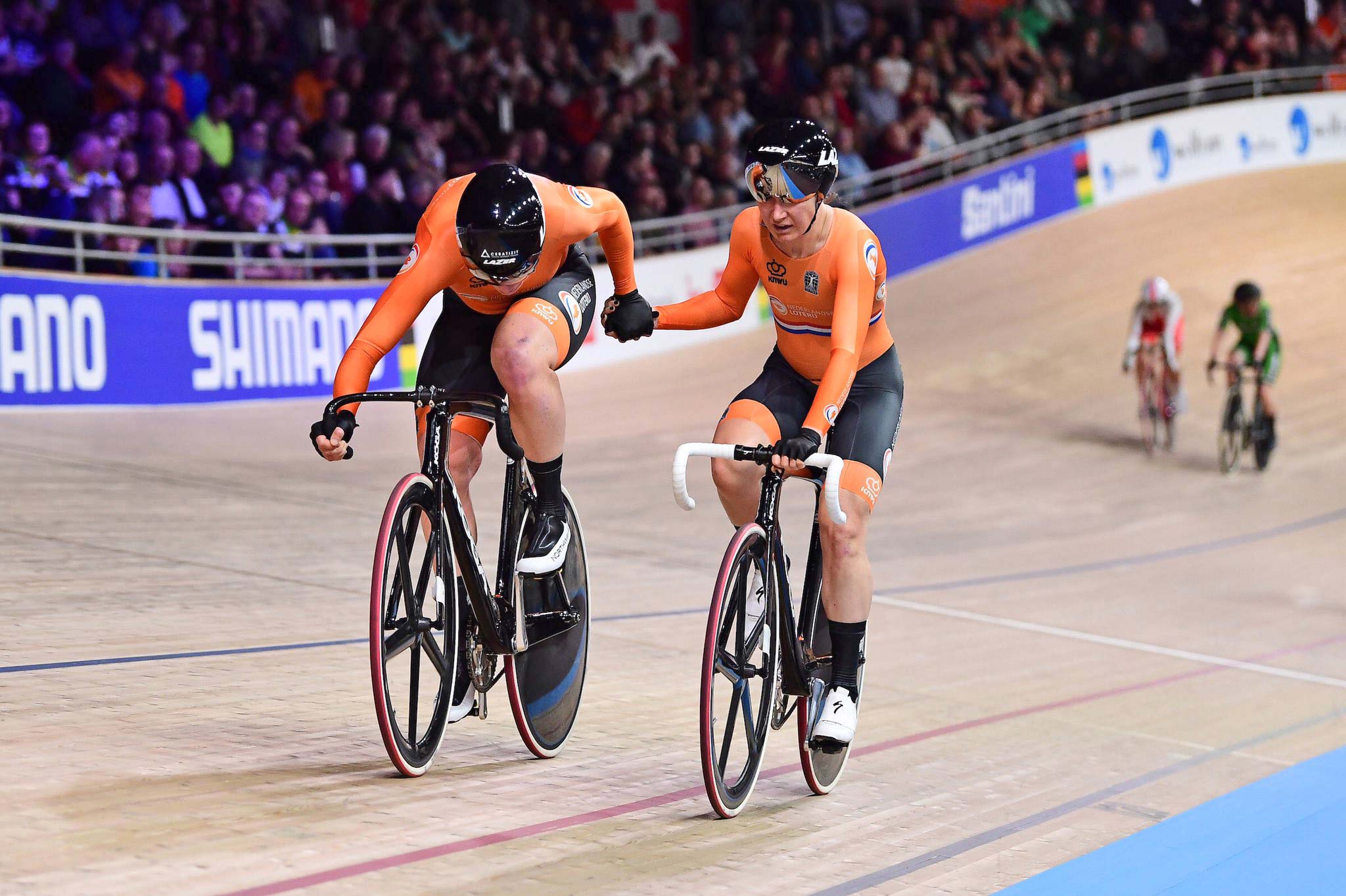
Kirsten Wild and Amy Pieters during their winning ride in the Madison. (Photo: @UCI_Track)
This year is meant to herald the return of the Madison to the Olympic program, and the first time in which there is also a Madison gold medal on offer for women in an event involving two riders per team (30km for women, 50km for men).
The Madison made its debut at the Olympics in 2000 and the Australian team won its only gold medal at the ‘home’ Games, with Scott McGrory and Brett Aitken both overcoming significant personal setbacks to claim an emotional victory. That happened on the same day that the four-minute barrier was broken in a team pursuit.
Since Germany’s triumph, in 3:59.710, during the final in Sydney 2000, the team pursuit world record time has fallen regularly, often during competition at either the Olympic Games (2004, 2008, 2012 and 2016), world championships (2008, 2012 and 2019) or Commonwealth Games (2002 and 2018)… but what happened in Berlin on days one and two of the 2020 championships took this blue-riband contest to an entirely new level.
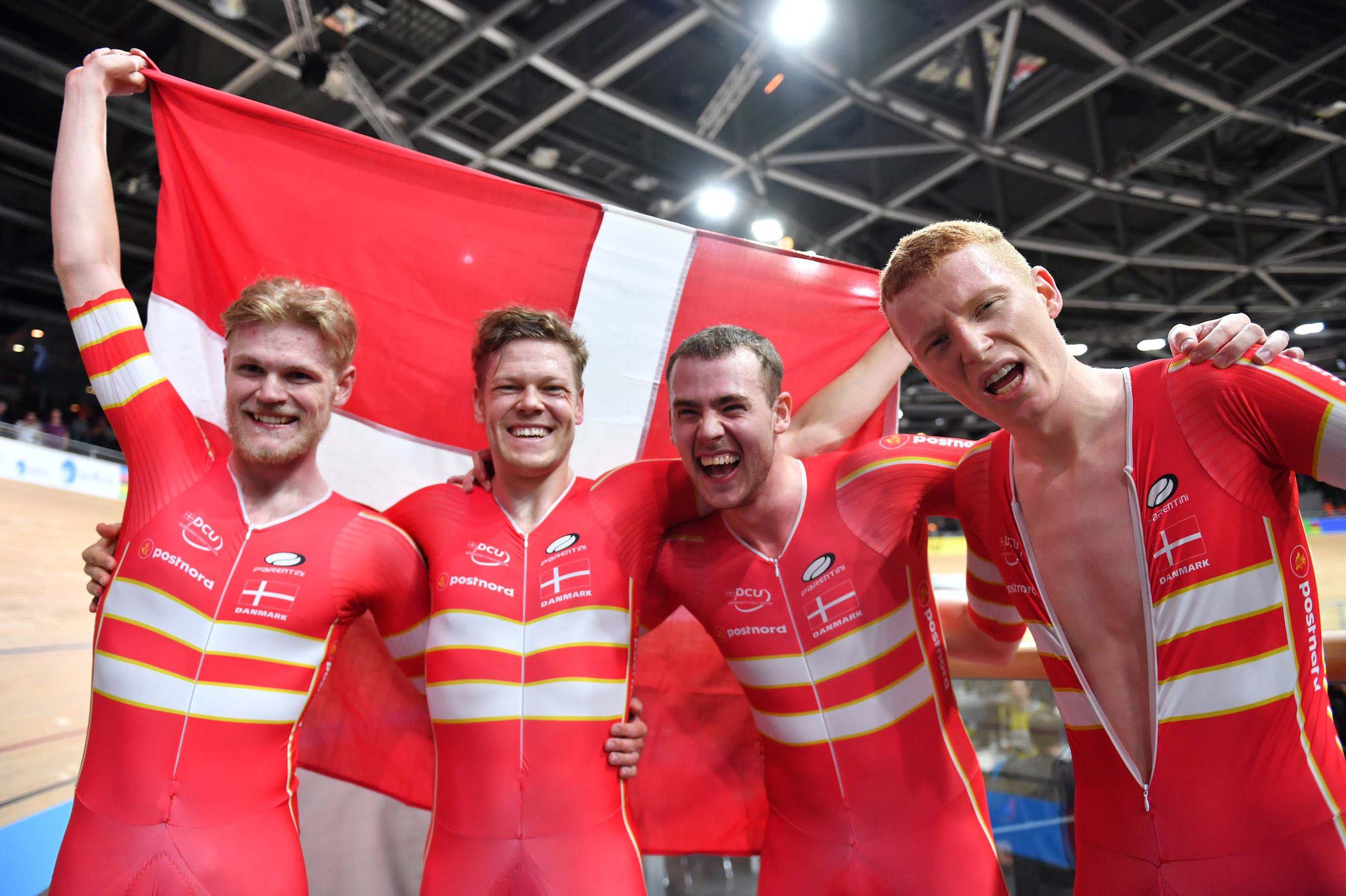
Three rides: three world records… fast, faster, fastest! Denmark won the team pursuit in 3:44.672. (Photo: @UCI_Track)
The Danish men’s team started the 2020 track worlds by posting 3:46.579 in qualifying, swiping a second and a half off the previous fastest time. The same foursome – Lasse Norman Hansen, Julius Johansen, Frederik Madsen and Rasmus Pedersen – beat their own record with each ride: round one – 3:46.203; final – 3:44.672.
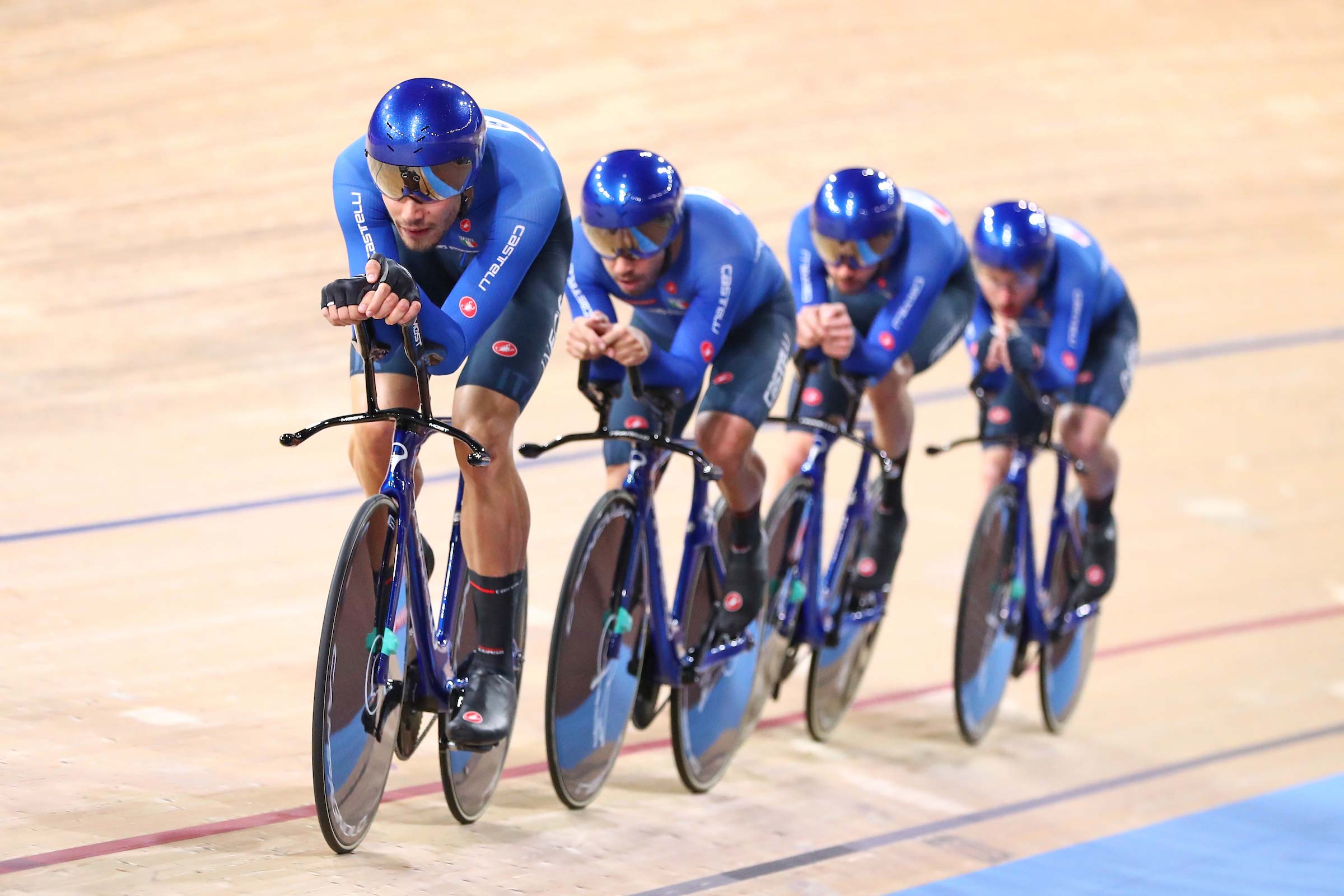
Italy was second-fastest in the first round of the team pursuit (beaten only by a world record) but as the team lost to Denmark, it would only progress to the bronze medal ride off, against Australia. Led by Filippo Ganna, the squadra azzurra caught the defending champions, Australia. (Photo: @UCI_Track)
An obsession with the men’s TP
Australian cycling has a rich history in the team pursuit and this is one of the reasons why most of RIDE Media’s coverage of track cycling in recent years has been skewed towards one of many events.
Since the Aussie team took the world record mark to 4:03.840 at the first ‘open’ worlds in 1993, at the beginning of the amalgamation of ‘pro’ and ‘amateur’ track cycling, I have followed the progression of this event with great interest. Before that, as an impressionable teenager, I was struck by the beauty of the event when Australia’s quartet claimed Olympic gold in LA in 1984.
My personal obsession for team pursuiting does take into consideration accomplishments of both men and women, but the history of the women’s pursuit just isn’t as long and although the US team’s performance in Berlin was impressive, as with many other events on the program, there wasn’t any coverage on RIDE Media.
Watching from afar, it wasn’t possible to report on all of the racing, and so I honed in on the world record rides of the Danish men in an event that I’m proud to have documented for many years.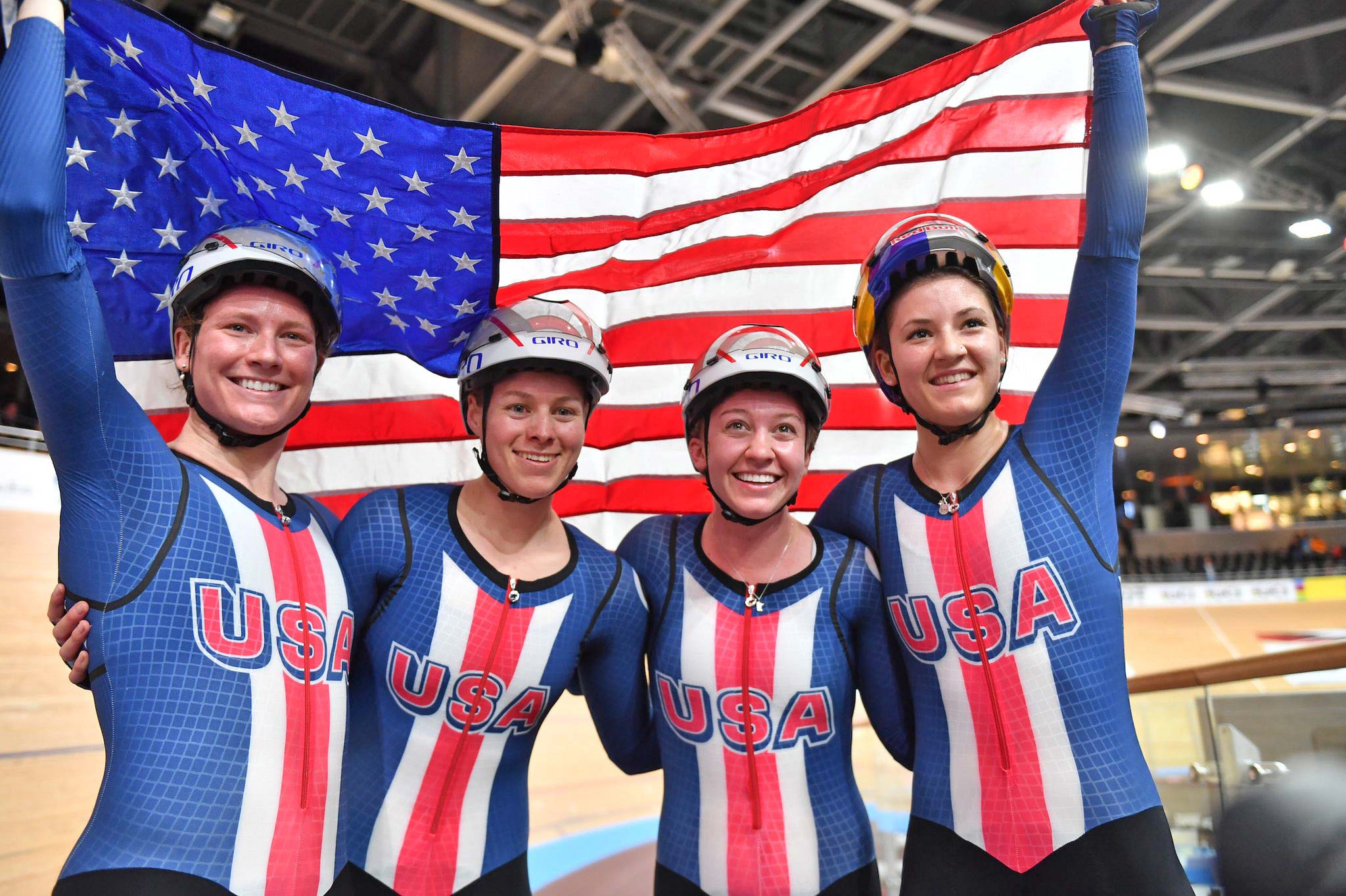 America’s women were amongst the most celebrated athletes at the five days of competition at the 2020 worlds in Germany, key amongst them the formidable Chloe Dygert who has only gone from good to better since she burst into prominence – on both the track and road – as a junior a few years ago.
America’s women were amongst the most celebrated athletes at the five days of competition at the 2020 worlds in Germany, key amongst them the formidable Chloe Dygert who has only gone from good to better since she burst into prominence – on both the track and road – as a junior a few years ago.
Dygert is an unstoppable force who offers cycling fans in the US reason to believe that there will be an ongoing acquisition of more rainbow jerseys (and more world records) for many years come.
In time, with the likes of Dygert doing what they do, there will be more interest lavished upon the women’s team pursuit (certainly by me, as I continue to follow track cycling; and, hopefully, by a growing wave of fans and sporting media who should be enticed to find out more about this fantastic contest of power and precision).
The history of my infatuation with the event extends back to 1993 for men; while women have only had the opportunity to race the TP at the worlds since it was introduced to the program as recently as 2008.
The reality about RIDE Media’s reporting of the worlds is that I was (unfortunately) only following the action from Australia. Frankly, it was difficult to even watch the racing over here, and this is another story that requires further examination. (I’ll leave my comments about the televised coverage for another post at another time.)
What a performance by Team USA ??
? 4:11.235 for the GOLD medal! ? #Berlin2020 pic.twitter.com/gzHqfuCqmV
— UCI Track Cycling (@UCI_Track) February 27, 2020
The Italian rocket ? is on the turbo ahead of his IP Qualification ride! @GannaFilippo ?? #Berlin2020 pic.twitter.com/UycqWmSZXg
— UCI Track Cycling (@UCI_Track) February 28, 2020
A world record that seems a fantasy…
Year after year, the team pursuit delivers fantastic racing and my obsession has only grown in the past week now that the Danish team has taken the time to a level that would have seemed like pure fantasy not too long ago.
If you told someone 20 years ago that the world record would be what it is today, you’d have been declared crazy. Hell, a week ago, if you said that the 3:48.012 mark that the Australians set at the world championships only a year ago would fall to 3:44.679, a popular Aussie staying could have been the reply: ‘Tell them they’re dreaming!’
But it happened. And the record-breaking conquests in Berlin didn’t stop with my pet event.
Record times were achieved in five events over the five days of racing in Germany:
- Men’s team sprint (Netherlands – Jeffrey Hoogland, Harrie Lavreysen, Roy van den Berg): 41.225
- Men’s individual pursuit (Filippo Ganna, Italy): 4:01.934
- Men’s flying 200m, sprint qualifying (Harrie Lavreysen, Netherlands): 9.256
- Men’s 1,000m time trial ‘Kilo’ (sea-level world best: Quentin Lafargue, France): 59.324
- Women’s individual pursuit (Chloe Dygert, USA): 3:16.937
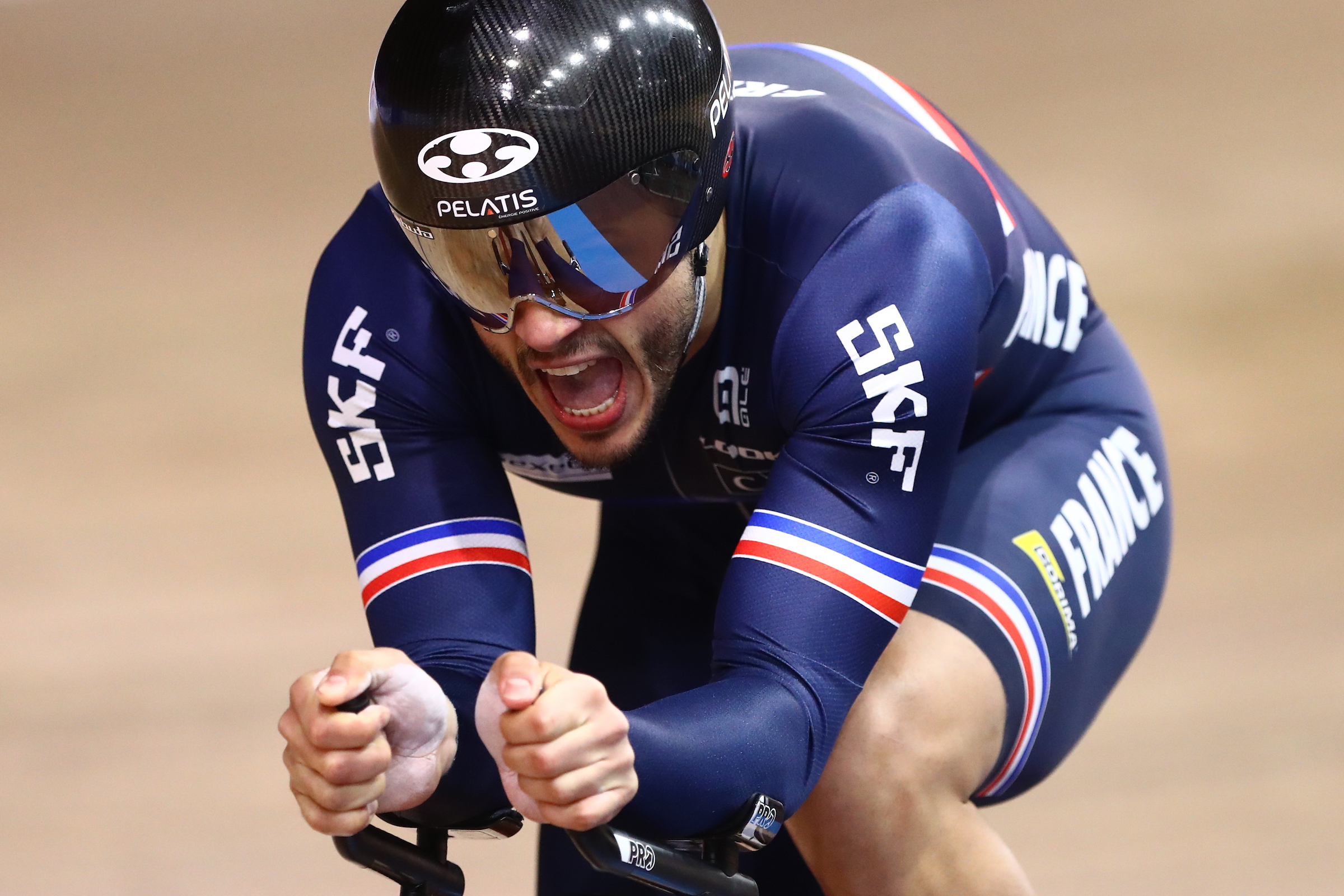
Quentin Lafargue set the fast ‘kilo’ time… at sea-level. This is not a formal world record, as that is owned by Lafargue’s compatriot, Francois Pervis (56.303).
No gold for Australia
The world championships of 2020 provided an opportunity for the Australian Cycling Team to reveal new bikes by Argon18 on the eve of racing. And the usual suspects duly stepped up to the line and reminded us that there is strength in the ranks.
Still, in contrast to recent campaigns, the Aussies came home without many medals.
Kaarle McCulloch and Steph Morton, last year’s team sprint world champions, were good in Berlin but not fast enough to overcome the impressive pace of the local pairing, Pauline Grabosch and Emma Hinze. (Hinze would, in fact, round out the championships with three gold medals for herself: team sprint, sprint and keirin).
Silver for McCulloch and Morton (below) would be the best result for the Aussies in #Berlin2020.
Consistent for years, McCulloch and Morton were only a fraction of second from defending their title and they are yet to reach their peak form. The two bronze medals for Australia were also earned by riders in the sprint category: Morton in the keirin (behind Hinze and last year’s world champion, Lee Wai Sze of Hong Kong); and the men’s team sprint with Tom Cornish, Nathan Hart and Matthew Richardson relegating France to fourth on the day that the Dutch posted the new world record.
The two bronze medals for Australia were also earned by riders in the sprint category: Morton in the keirin (behind Hinze and last year’s world champion, Lee Wai Sze of Hong Kong); and the men’s team sprint with Tom Cornish, Nathan Hart and Matthew Richardson relegating France to fourth on the day that the Dutch posted the new world record.
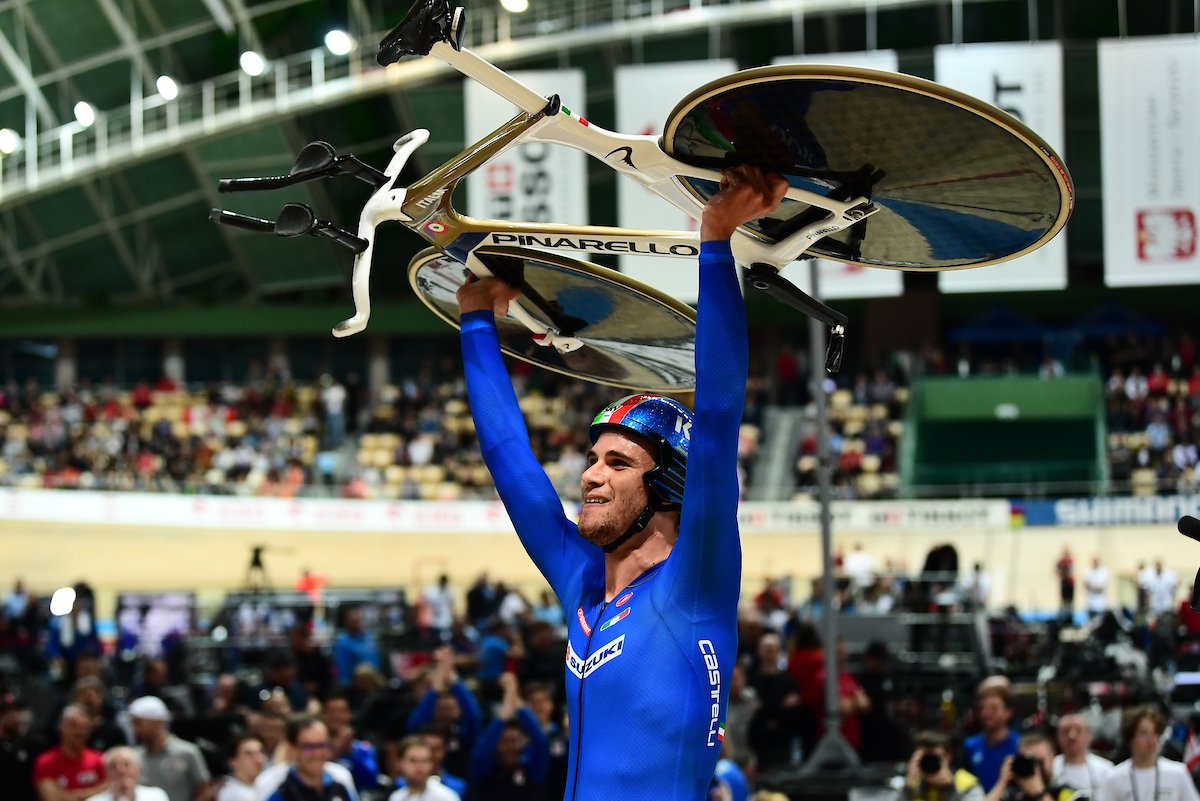
Filippo Ganna: individual pursuit world champion and world record holder. (Photo: @swpixtweets)
World records in both individual pursuits
Fast times were a theme of the championships. It’s clear that the prospect of the (possible) racing in Tokyo is prompting experimentation with equipment and training methods, and one of the outcomes is world records, even in non-Olympic events.
The individual pursuit was last contested at the Olympics in 2008 (when Bradley Wiggins beat New Zealand’s Hayden Roulston in the final, 4:15.031 vs 4:18.990).
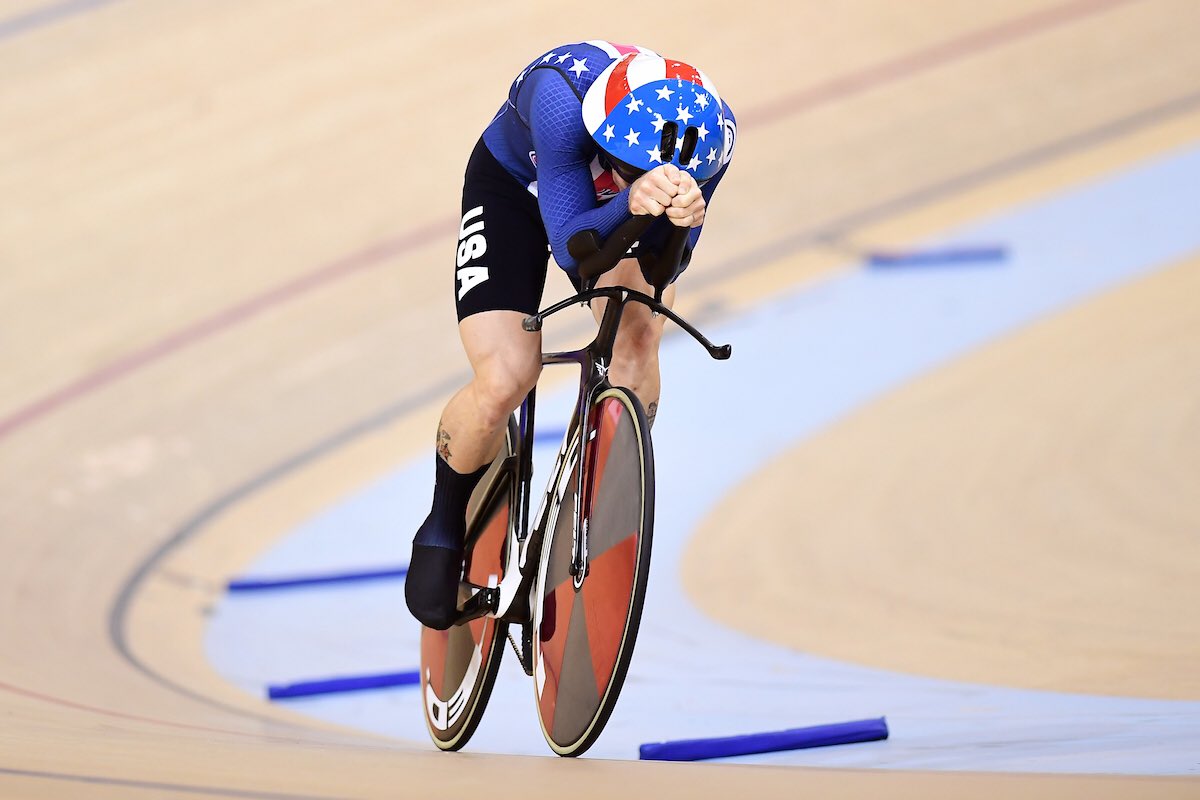
Former IP world record holder, Ashton Lambie of USA was also super-fast in Berlin: second behind a phenomenal Ganna. (Photo: @UCI_Track)
Wiggins isn’t a slouch. He has won the Tour de France (2012), set an hour record (54.526km), and he’s collected five Olympic gold medals since his debut at the Games as a 20-year-old in Sydney. His record of accomplishments remains highly relevant today… but when comparing his Olympic winning time from Beijing 12 years ago with what Filippo Ganna did on the weekend, it’s positively slow.
Filippo Ganna was already the world record holder, courtesy of the remarkable 4:02.647 he set at the Minsk World Cup in November 2019. Earlier in that competition, he eclipsed Ashton Lambie’s previous record in qualifying and the Italian heralded his arrival as The Fastest Pursuit Rider Of All Time.
Ganna confirmed that in qualifying in Berlin on Friday night. His world record, just like the Danes’ in the team event, is so quick that it would seem implausible… unless it happened.
It did happen. It is quick. And it is a reminder that this event really should be back on the Olympic program.
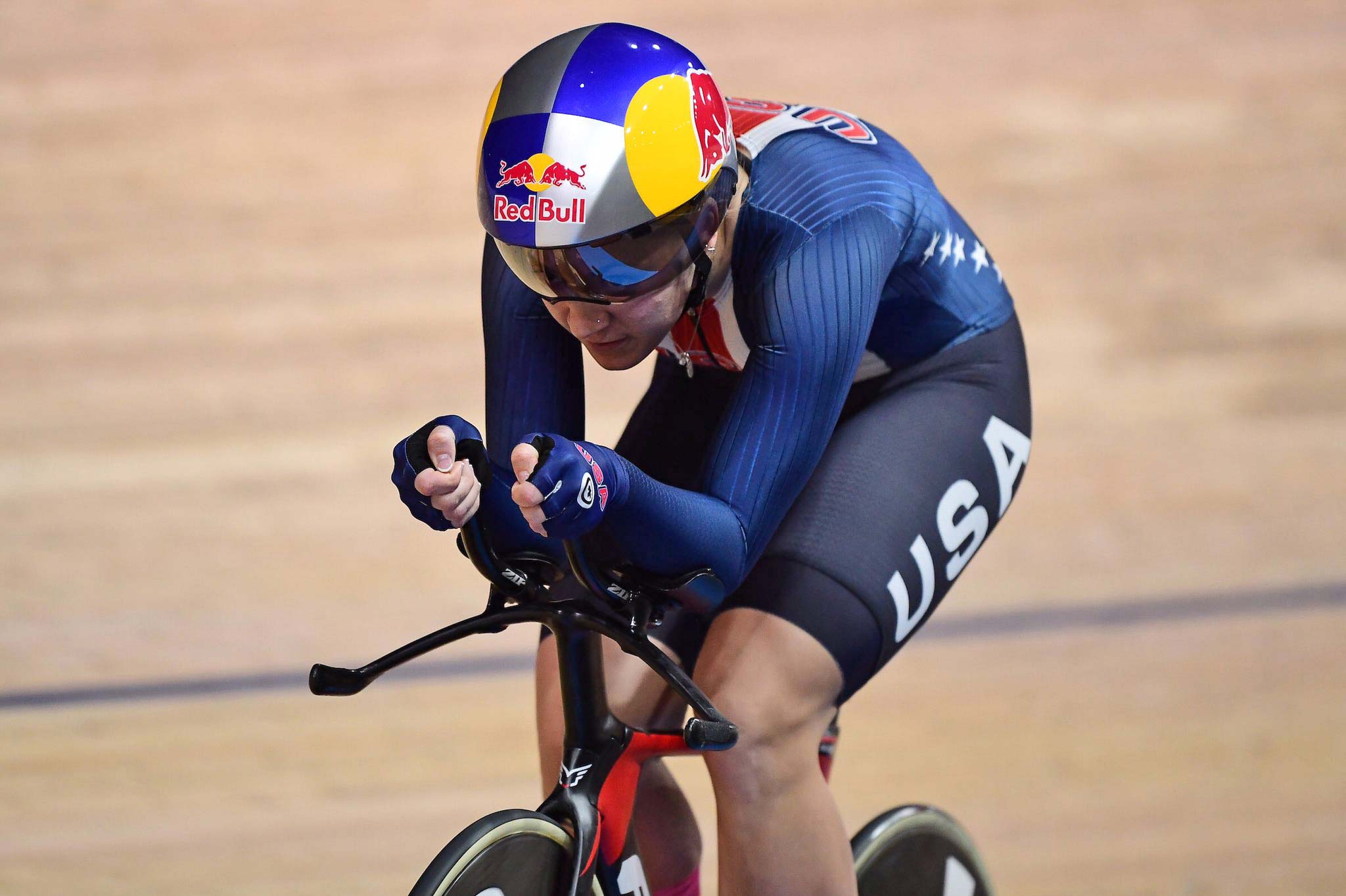
Chloe Dygert, the most consistently good cyclist of her generation? (Photo: @UCI_Track)
In the final, Ganna would go on to win the gold (against Lambie) but, by then, it was something of a formality because if someone can ride 4:01.934 from a standing start, the opposition knows they are fighting to limit losses. As inspired and as fast as Lambie was on the weekend, he didn’t have any answer to the record-breaking pace set by Ganna.
Ganna’s showcase of speed and power and aerodynamics was on Friday night. Then came Chloe Dygert’s chance to claim a second gold medal (after the US victory in the TP early in the championships) and, for good measure, a world record in the 3,000m women’s IP.
Again, we can look at the record progression to realise that Dygert is in a league of her own.
There is a long list of celebrated cyclists who have owned the women’s individual pursuit world record, amongst them: Beryl Burton, Jeannie Longo, Mario Clignet, Leontien van Moorsel-Zijlaard, Sarah Ulmer… and, lately, Ms Dygert, who has won the event at the world championships three times since 2017!
By the age of 23, Dygert has broken the IP world record four times, most recently in the final in Berlin when she beat the record time posted in qualifying. (And this comes two years after she dropped the world record twice in a day at the worlds of 2018.)
Dygert stopped the clock at 3:16.937 on Saturday! That’s almost 14 seconds faster than when van Moorsel-Zijlaard won the Olympic title in Sydney (one of the Dutchwoman’s three gold medals at the 2000 Games).
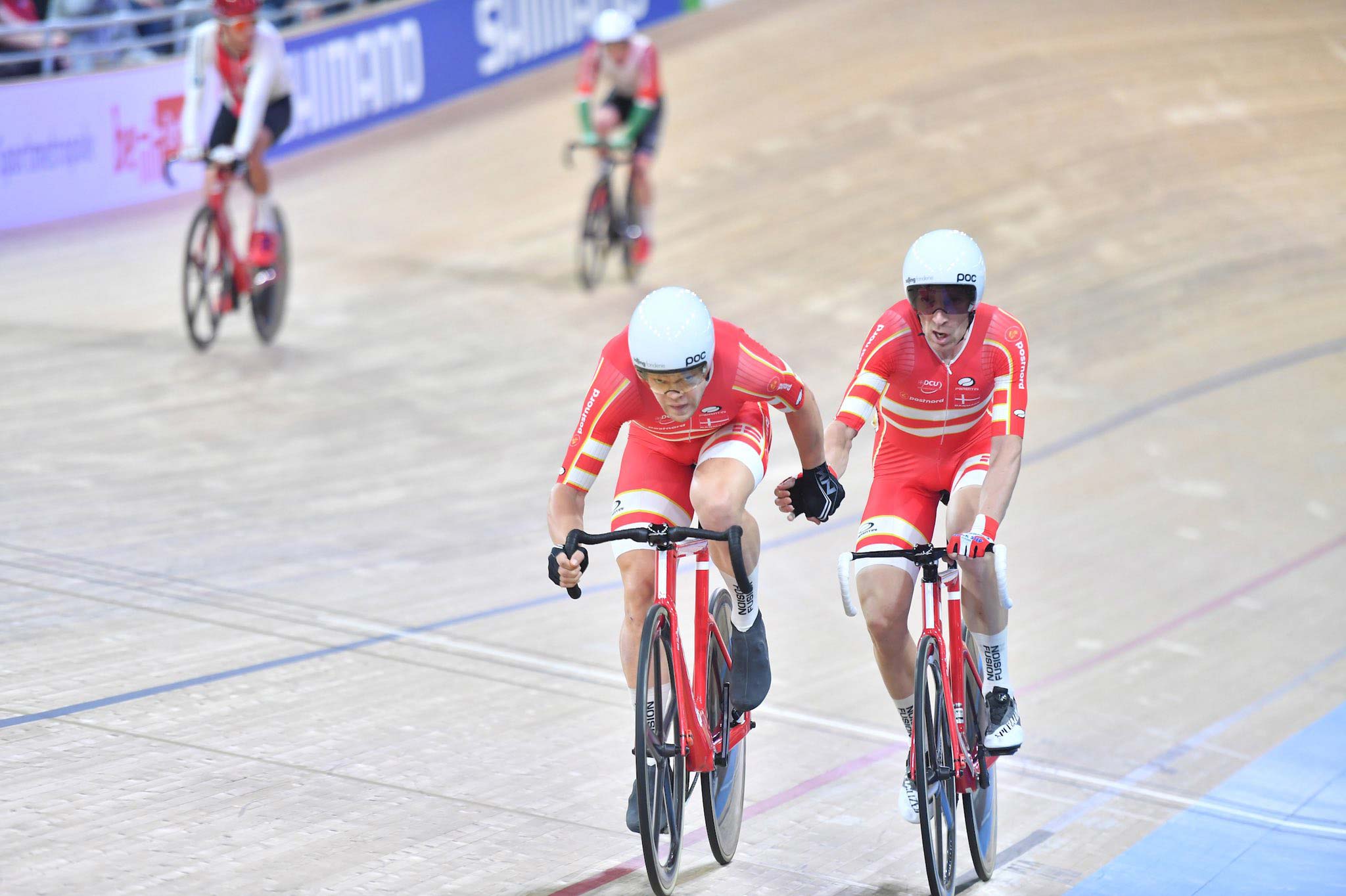
Michael Morkøv slings in his Madison team-mate, Lasse Norman Hansen, on the last night of competition. (Photo: @UCI_Track)
Hansen and Morkøv: Madison gold… after COVID-19 scare
Exactly what impact the novel coronavirus is yet to have nobody knows, but in the past week it brought a rich race in the Middle East to a halt and put many involved with the UAE Tour in quarantine. Some are still holed up in hotels, waiting to find out if they are healthy, and when they can leave.
Meanwhile, only a few hours before news of the COVID-19 ‘positive tests’ in the UAE shook the cycling world, Michael Morkøv made his exit from the race, destination Berlin.
Morkøv told RIDE Media in January that he and Lasse Norman Hansen were virtually assured of an Olympic start in the Madison… and the Danish pair combined forces in Berlin overnight to back up from their European championship victory last year to earn gold in one of the final events of the program.
There were concerns that Morkøv’s early departure risked spreading coronavirus to the riders, staff and crowd at the velodrome in Berlin, but those concerns were nullified when his test results were negative. Still, even the prospect of infection added angst to the championships and reiterated the point that things are far from business-as-usual in 2020.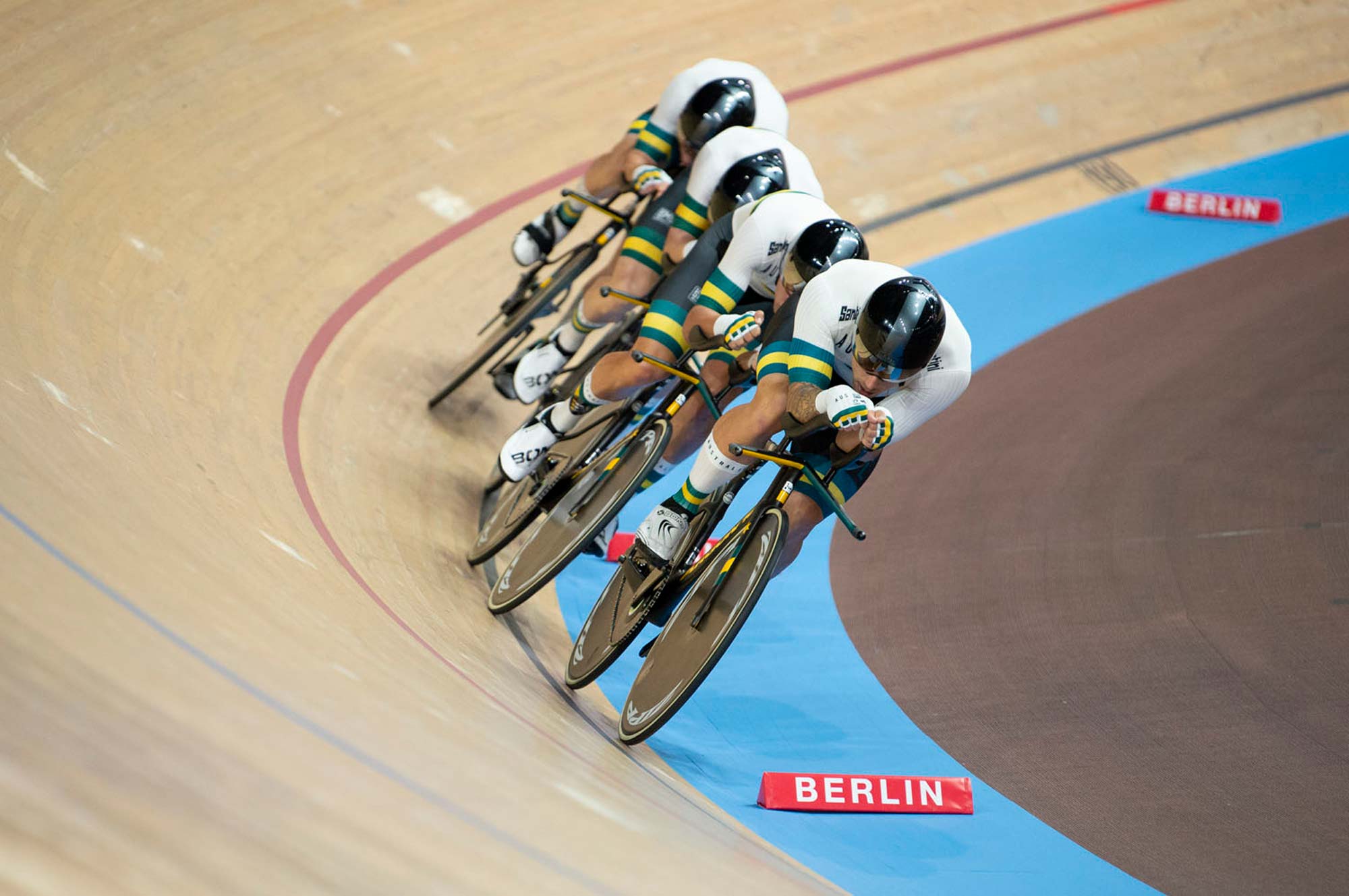 This was a world championship in which the traditionally dominant teams of track cycling – Great Britain and Australia – finished well down the medal tally. It’s also marks the arrival of Denmark as a genuine world-beating force and provides a confirmation that the work by Team USA is yielding dividends, through Dygert and, parochially, her Aussie coach Gary Sutton.
This was a world championship in which the traditionally dominant teams of track cycling – Great Britain and Australia – finished well down the medal tally. It’s also marks the arrival of Denmark as a genuine world-beating force and provides a confirmation that the work by Team USA is yielding dividends, through Dygert and, parochially, her Aussie coach Gary Sutton.
It was a championship that included domination by the Dutch, impressive performances from the home team, the arrival of Japan as a gold medal-winning nation again (thanks to Yumi Kajihara in the Omnium), record times by Danish, Dutch and Italian riders… and an enthusiastic crowd that grew night after night until it was a capacity stadium on Sunday. There was, by all accounts, amazing racing and plenty of emotion. Could it also be the time when track cycling rises up and generates some headlines and brings cycling to the people? It has that potential… but, alas – in Australia at least – the answer is no.
There was, by all accounts, amazing racing and plenty of emotion. Could it also be the time when track cycling rises up and generates some headlines and brings cycling to the people? It has that potential… but, alas – in Australia at least – the answer is no.
In terms of interest in the sport, track cycling remains the poor cousin of other disciplines. Those who know about it, love it. Those who are learning about it, may come to understand the intricacies and realise that it is something that many could actually practice down at the local track. But, sadly, it just doesn’t seem to hold any appeal for the Australian media.
The worlds – good as they were – have come and gone for another year. There are a wealth of stories from the championships… but few have been told at a time when there are many other news items getting priority.
* * * * *
The news cycle has rarely been as intense as it is right now. Each hour brings new reports on the impact of COVID-19 and, for the moment, it is uncertain if even the Olympics will go ahead.
Traditionally the fast times of a track world championships in an Olympic year are eclipsed when the ‘bigger’ event rolls around a few months later. In March 2020, we wait to see if there will indeed be racing in the Games of the 32nd Olympiad.
– By Rob Arnold


